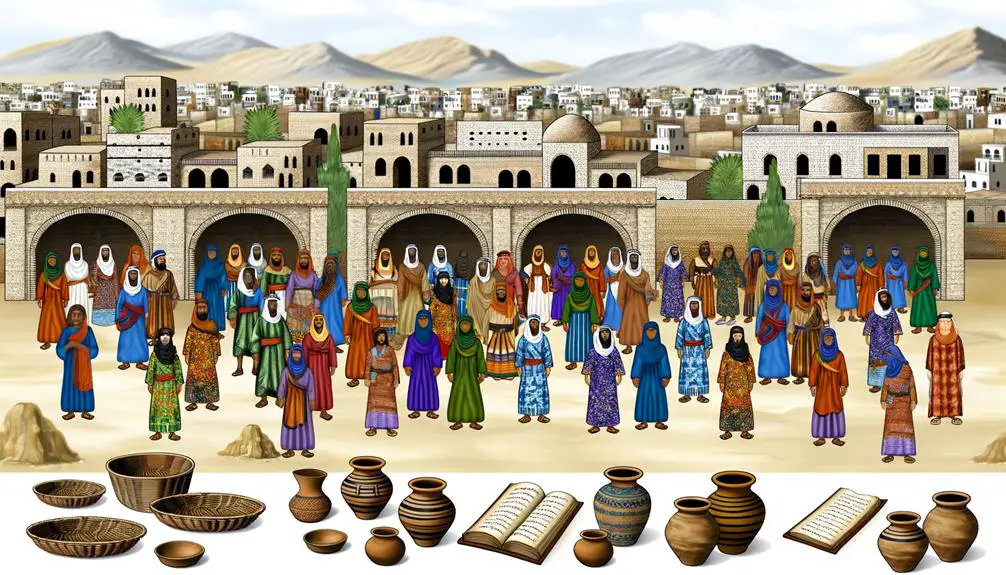Peek into the biblical meaning of 'defile' to explore how spiritual impurity affects community and personal faith—discover more.

Defile Definition in the Bible
In the Bible, to "defile" means you've incurred a spiritual or moral impurity that impacts not only your relationship with God but also how you're integrated into your community. This concept of defilement is closely tied to the cultural and societal norms of ancient Israel, where communal and individual purity were paramount. Defilement could stem from either ritualistic violations, such as consuming unclean foods, or moral breaches, such as unethical behavior. The consequences were serious, leading to social isolation and internal conflict regarding one's spiritual state. Understanding these distinctions reveals the profound interplay between individual actions and communal sanctity.
Key Takeaways
- In the Bible, defilement refers to a state of spiritual contamination and impurity.
- It affects one's relationship with God and participation in community rituals.
- Defilement can result from both physical actions and moral transgressions.
- The Bible outlines specific rituals and practices for purification from defilement.
- Understanding of defilement is rooted in cultural, historical, and religious contexts of ancient societies.
Historical Context of Defilement

In ancient times, a person's defilement was often seen as a profound spiritual contamination, impacting both their relationship with God and their community. This concept was deeply rooted in the cultural influences and societal norms of various civilizations across the historical canvas. You'll find that in many societies, purity was not just a personal issue but a communal imperative. The collective ethos dictated strict adherence to purity laws, which were believed to protect the community from divine wrath or misfortune.
Cultural influences shaped the understanding and practices surrounding defilement. For instance, in some cultures, the natural phenomena like menstrual blood or childbirth were considered defiling. This wasn't merely a biological view but a complex interweaving of cultural perceptions about purity, danger, and the sacred.
Moreover, societal norms often dictated the responses to and treatments of the defiled persons. These norms weren't static; they evolved with the shifting theological interpretations and socio-political changes. By exploring these norms, you can discern how societies tried to balance the spiritual purity with the pragmatic aspects of community life, showing a dynamic interaction between belief systems and social structures.
As you investigate further, it's clear that defilement, in its essence, was a reflection of the times and thought processes of ancient societies.
Defilement in the Torah
Reflecting on how ancient cultures viewed defilement, we see this theme deeply embedded in the Torah, where purity laws profoundly influenced the daily lives and spiritual practices of the Israelites. You'll find that these laws were not merely arbitrary rules but were integral to maintaining both communal harmony and individual sanctity. The Torah weaves a complex fabric of instructions that delineate clean from unclean, sacred from profane.
Central to these purity laws are ceremonial foods, which served both as sustenance and as symbols of deeper spiritual truths. For example, specific dietary laws distinguished clean animals from unclean ones, guiding the Israelites in what was fit to eat and what must be avoided to prevent defilement. This was not just about health; it was about holiness.
Ancestral customs also played a pivotal role in shaping the concepts of purity. These customs weren't static; they adapted over time while preserving a continuity with the past. Each generation of Israelites found themselves guardians of these sacred traditions, ensuring that the divine instructions handed down through Moses remained alive and relevant.
Through these practices, you see how deeply defilement and purity were woven into the fabric of Israelite society, reflecting a profound reverence for the divine commandments.
Ritualistic Vs. Moral Impurity

You'll find that in the domain of biblical defilement, the distinction between ritualistic and moral impurity is profound. Each type of impurity commands specific purification practices, which are not merely ceremonial but deeply symbolic, carrying significant moral implications. By exploring types of ritual impurity and examples of moral defilement, you gain a clearer understanding of how these concepts have shaped religious conduct and personal piety.
Types of Ritual Impurity
Understanding the distinctions between ritualistic and moral impurity is essential to comprehending biblical concepts of defilement. In the domain of ritual purity, ceremonial cleanliness plays a pivotal role. It's about adhering to specific laws designed to maintain a state of spiritual and physical sanctity, especially in contexts of worship and sacred interaction. The sources of impurity, in this case, often derive from natural human conditions or actions, such as childbirth or touching a dead body, which, while not morally wrong, require ritual purification. This system underscores the separation between the holy and the common, ensuring that you approach the divine with due reverence. It's a nuanced interplay of actions and sanctity, distinct from moral failings.
Examples of Moral Defilement
Moral defilement in the Bible encompasses actions that transgress divine commands, contrasting sharply with ritualistic impurity, which arises from unavoidable human conditions. You'll find that the scriptures often highlight how immoral thoughts and actions, stemming from ethical corruption, can deeply defile a person's spirit. This type of defilement is not about physical contact or external uncleanliness but is rooted in the choices and desires that distance you from divine principles.
For instance, harboring jealousy, greed, or deceit are seen as defiling acts because they corrupt the moral integrity required by God's laws. These are not mere breaches of ceremonial protocol but are serious violations against the moral order established by God, impacting not only the individual but the wider community.
Purification Practices Explained
While moral defilement concerns the ethical breaches distancing individuals from God's laws, ritualistic impurity in the Bible involves prescribed ceremonies for purification after specific events or conditions. You'll find that these practices aren't just detailed rituals; they carry contemporary relevance, providing a framework for understanding how cultural influences shape religious observance. For instance, the process of purification after childbirth or contact with the dead reflects a deep intertwining of spiritual cleanliness and societal norms. These distinctions between ritualistic and moral impurities highlight a holistic approach to sanctity, suggesting that both forms of purity are essential for maintaining a relationship with the divine. This dual focus invites you to contemplate how your own cultural background influences your perceptions of spiritual purity today.
Consequences of Being Defiled

How does defilement impact an individual's spiritual and communal standing according to biblical teachings? The consequences of being defiled in a biblical context are profound, affecting both your relationship with God and your position within the community. The social stigma attached to defilement is significant. It can lead to isolation and exclusion from religious practices and social interactions, which are central to communal life in biblical times. This isolation not only affects your status but also deepens the psychological impact, leading to feelings of shame and unworthiness.
Being labeled as defiled impacts your spiritual life, as it hampers your ability to participate in sacred rituals, effectively cutting you off from the practices that define spiritual well-being in your community. This separation contributes to a deeper internal struggle, questioning one's purity and relationship with the divine. In such a context, the psychological burden can be profound, affecting your mental health and sense of identity.
Cleansing and Purification Rituals
In biblical times, various rituals were prescribed for cleansing and purification to restore one's spiritual and communal integrity. These practices weren't merely about physical cleanliness but were deeply entrenched in ceremonial symbolism, reflecting a profound understanding of sanitation symbolism. You'll find that the Levitical laws, for example, include detailed instructions for rituals that serve not only to cleanse but also to signify reintegration into community life.
These purification rituals often required water, ashes, or blood, elements rich in symbolic meaning. Water, for instance, symbolizes life and renewal, while blood represents atonement. The use of these elements in rituals underscores their dual roles in both physical sanitation and spiritual cleansing. You were expected to engage in these practices not just to adhere to societal norms but to maintain a relationship with the divine.
Furthermore, the process of purification was not instantaneous; it often involved a period of waiting, emphasizing the importance of patience and reflection in the journey back to purity. This layered approach to cleansing highlights how intertwined the physical and spiritual were in your quest to uphold the sacredness of the community and personal piety.
Modern Interpretations of Defilement

Shifting our focus to contemporary times, interpretations of defilement have evolved, reflecting changes in societal values and theological understanding. You'll find that modern scholars and theologians often approach the concept of defilement through the lens of cultural relativism, acknowledging that what is considered defiling can vary dramatically across different cultures and historical periods. This perspective allows for a more nuanced interpretation of biblical texts that historically defined defilement in specific cultural contexts.
Moreover, the psychological impact of perceived defilement now receives greater attention. It's understood that the feeling of being defiled can lead to significant emotional and mental distress, which is why contemporary religious leaders and counselors often address these issues with sensitivity and care. They aim to reinterpret traditional teachings to foster a supportive community environment, where the sense of spiritual purity and communal harmony is maintained without causing psychological harm.
Thus, in your journey through these modern interpretations, you're encouraged to ponder how shifts in understanding defilement might influence your personal and communal spiritual practices. By recognizing the depth of historical context and its evolution, you can more fully appreciate the complex interplay between ancient texts and their relevance to today's diverse and dynamic world.
Frequently Asked Questions
How Do Different Denominations View Biblical Defilement Today?
Different denominations interpret biblical defilement uniquely, focusing on ceremonial purity and its ritual significance. You'll find varying degrees of emphasis on spiritual versus physical purity among these groups, reflecting diverse theological perspectives.
Can Defilement Concepts Affect Interpersonal Relationships in Modern Times?
Yes, defilement concepts can impact modern relationships. You'll see social stigmas and cultural interpretations sway interactions, creating barriers where once there were none, all steeped in historical beliefs now dressed in modern garb.
Are There Psychological Impacts Associated With Feelings of Defilement?
Yes, feelings of defilement can greatly impact your psychological state, often disturbing your emotional purity and eliciting strong guilt responses, which may alter self-perception and influence your interactions with others deeply.
How Do Defilement Teachings Influence Children's Moral Education?
Defilement teachings deeply delineate moral clarity, guiding children's ethical evolution. Your educational methods must thoughtfully integrate these lessons to foster reverence, responsibility, and a profound perceptiveness in interpreting moral complexities.
Is There a Link Between Defilement and Dietary Laws in Contemporary Practice?
In contemporary practice, you'll find that cultural adaptations and health interpretations link defilement to dietary laws, subtly influencing modern behaviors and beliefs about cleanliness and purity in various religious and secular contexts.



Sign up